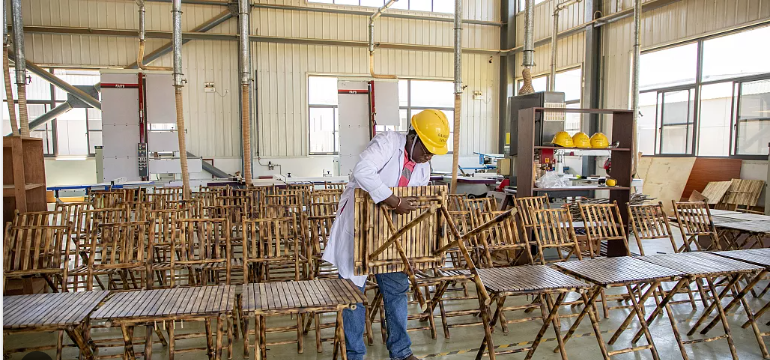Bamboo farming in Uganda on the rise as gov’t seeks to increase export

Bamboo cultivation is experiencing a surge in Uganda, recognized by the government as a promising avenue for economic growth. Local officials highlight its potential as a renewable source of fuel, alleviating strain on diminishing forest reserves. Environmentalists praise its resilience and adaptability, while businesses view it as a profitable commodity with diverse applications, from furniture to utensils.
Taga Nuwagaba, a bamboo farmer and entrepreneur, operates a bamboo furniture factory near Kampala. He emphasizes the versatility of bamboo as a material, showcasing various products crafted from it, including tables, chairs, pens, cups, and sculptures.
While some bamboo species are imported from Asia, many thrive naturally in Uganda, contributing to local cuisine and commerce. Kitara Farm exemplifies successful commercial bamboo cultivation, serving as a model for interested individuals seeking knowledge about bamboo farming.
Unlike eucalyptus, bamboo growth isn’t confined to specific seasons. It grows rapidly, regenerates easily, and thrives in diverse environments, even in poor soil conditions. Consequently, some farms have transitioned from eucalyptus to bamboo due to its long-term economic benefits.
Despite its potential, challenges persist, such as market expansion and public awareness. Nuwagaba stresses the need for widespread education about bamboo’s benefits and potential uses.
Bamboo farming presents an opportunity for farmers akin to traditional cash crops like coffee or tea. Financial institutions offer loans for bamboo plantation development, and bamboo seedlings are increasingly available through private nurseries.
However, bamboo’s growth as a significant industry in Uganda faces hurdles. While demand exists, supply struggles to keep pace due to insufficient raw materials. To address this, efforts are underway to encourage more widespread bamboo cultivation, aligned with the government’s reforestation policies aiming to plant 300,000 hectares of bamboo by 2029. Despite growing interest, achieving this ambitious target will require substantial efforts to incentivize rural farmers to embrace bamboo farming on a large scale.
